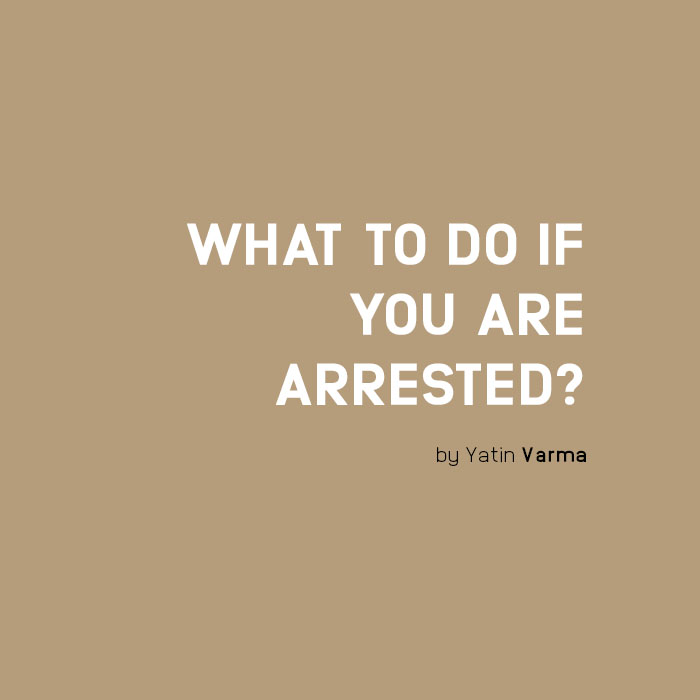Know your rights and what steps to take:-
In what circumstances can a person be arrested?
A person can be arrested when there is reasonable suspicion that he or she has committed or is likely to commit an offence.
Can a person be arrested without a warrant of arrest?
A person can be arrested with or without a warrant of arrest. In very rare cases, an arrest can be effected by a private individual.
What are your rights if you are arrested?
- Any person who is arrested or detained shall be informed as soon as is practicable, in a language that he understands, of the reasons of his arrest or detention;
- He shall be afforded reasonable facilities to consult a legal representative of his choice;
- A person in police custody should be allowed to speak on the phone to his legal adviser or his nearest relative provided that no hindrance is reasonably likely to be caused to the processes of investigation, or the administration of justice by his doing so;
- He should be supplied on request with writing materials and his letters should be sent by post or otherwise with the least possible delay;
(V) Any detainee or accused party, being suspected of having committed certain specified offences
should, upon arrest, be informed by the police officer in charge of the police station that he may make an application for legal assistance during police enquiry and for bail applications;
(VI) A person who is arrested will be invited to give a statement to the police. He has the right to insist that he will do so in the presence of his Barrister. He also has the right to remain silent and no adverse inference can be drawn from the exercise of that right. It should be ensured that all statements one is asked to sign are explained to that person in a language he understands. He should not fall in the trap of giving a statement hurriedly in return of a promise to be released on parole or on bail. No statement or document should be signed unless one fully comprehends its contents;
(VII) The statement can be written by the person arrested or by a police officer. The statement should be read carefully before signing. It is advisable that the certificate at the end of the statement be inserted by the suspect/detainee himself after he has been read it over and made corrections, if any ;
(VIIII) Reasonable arrangements should be made for the comfort and refreshments of persons being questioned or making a statement and the officers asking the questions or taking the statement should be seated;
(IX) Questioning cannot be oppressive and continue for long hours. There should be breaks at reasonable intervals;
(X) The police has no right to use force and a statement should not be given under duress. No person should be subjected to torture or to inhuman or degrading punishment or other such treatment and
(XI) That person should be brought without undue delay before a court of law.
Right to bail:
A person who is arrested will be released on bail or if there is police objection, has the right to apply for bail. The police also has the discretion to release an arrested person on parole
Interrogation of children and juveniles:
(I) A child means a person under the age of 18 and a juvenile a person aged 14 or above but below the age of 18. A child under 14 is not criminally responsible and cannot be prosecuted for any criminal offence;
(II) Children should only be interviewed in the presence of a parent or guardian, or in their absence, some person who is not a police officer and is of the same sex as the child;
(III) Every statement recorded from a juvenile offender during a criminal investigation should be recorded by the police in presence of his parent.Where the officer in charge of the police station has reasonable grounds to believe that the best interests of a juvenile offender so require, a statement may be recorded from him in the absence, or without the consent, of his parent, but in presence of a probation officer;
(IV) Where a juvenile is arrested, the police officer by whom he is arrested, or the officer in charge of the police station to which he is brought, as the case may be, should cause the parent of the juvenile where he can be found, to be warned to attend the Court before which the juvenile is to appear and
(V) Where a police officer has reasonable grounds to suspect that a child under the age of 14 has committed an offence, he shall, notwithstanding any other enactment, not detain the child but conduct an enquiry and immediately inform the Ministry responsible for the subject of probation and aftercare services.
Interrogation of foreigners:
In the case of a foreigner making a statement in his native language, the interpreter should take down the statement in the language in which it is made and an official translation should be made in due course and be proved as an exhibit with the original statement. A foreign national can also contact his embassy for support.
Medical attention:
A person who is arrested in need of medical attention should inform the police forthwith.
Right to compensation:
Any person who is unlawfully arrested or detained by any other person shall be entitled to compensation from that other person.


Leave a Reply